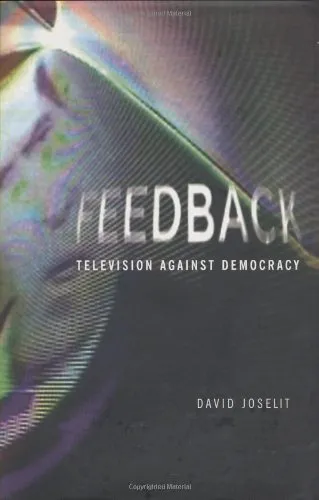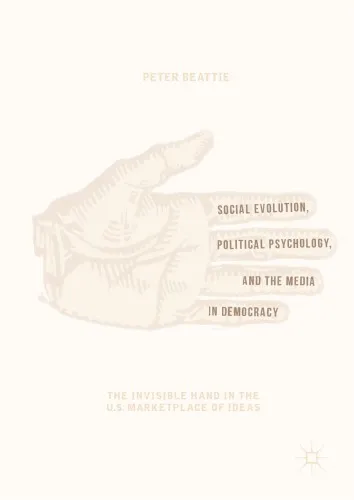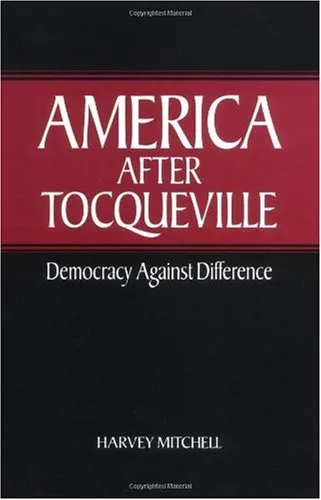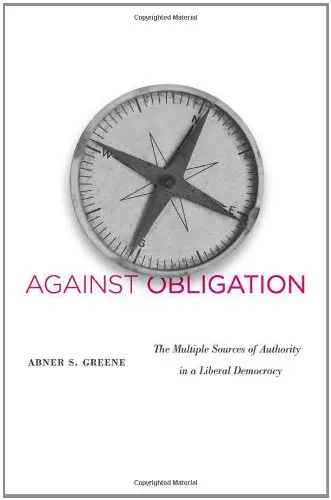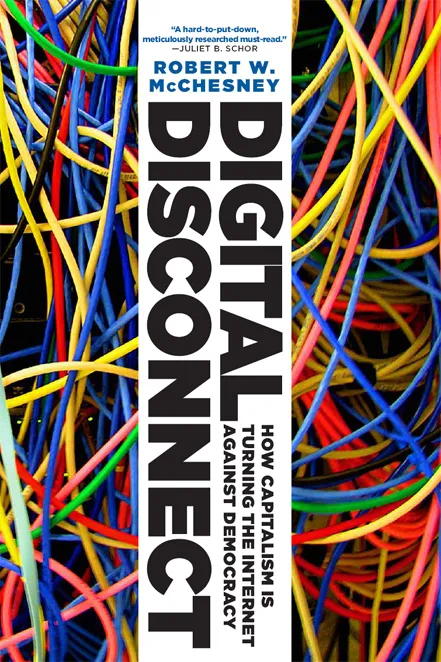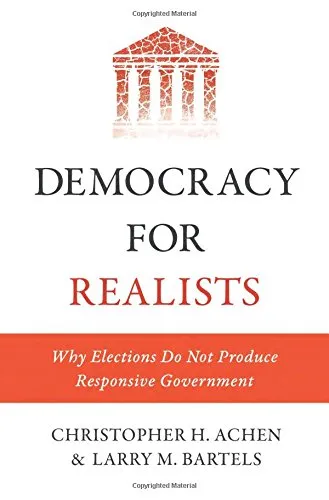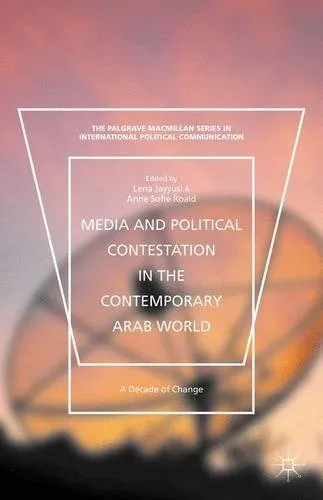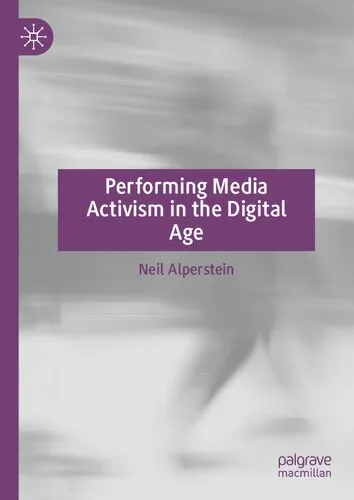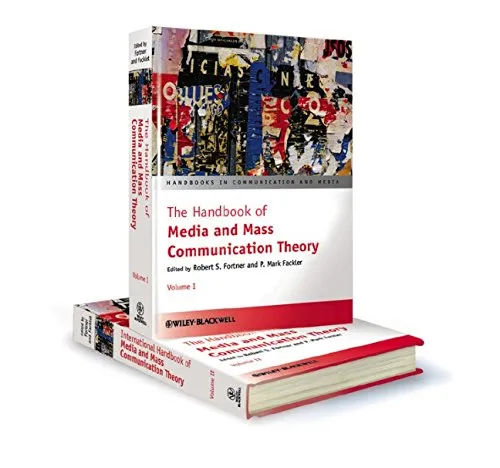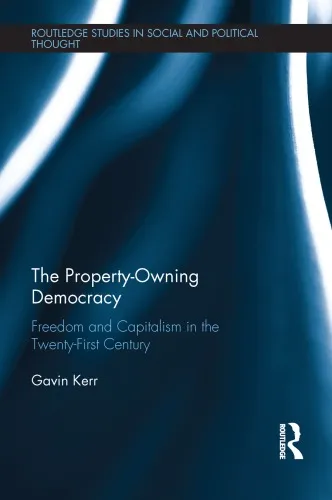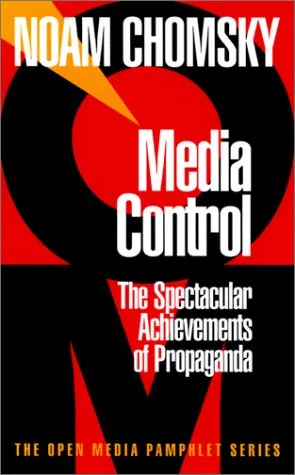Feedback: Television against Democracy
4.0
بر اساس نظر کاربران

شما میتونید سوالاتتون در باره کتاب رو از هوش مصنوعیش بعد از ورود بپرسید
هر دانلود یا پرسش از هوش مصنوعی 2 امتیاز لازم دارد، برای بدست آوردن امتیاز رایگان، به صفحه ی راهنمای امتیازات سر بزنید و یک سری کار ارزشمند انجام بدینکتاب های مرتبط:
معرفی کتاب "Feedback: Television against Democracy"
کتاب "Feedback: Television against Democracy" اثر دیوید جوسلیت (David Joselit)، یکی از تألیفات برجسته در حوزه تحلیل رسانههای جمعی مدرن است. این کتاب با نگاه انتقادی به تلویزیون به عنوان یکی از فراگیرترین ابزارهای فرهنگی قرن بیستم و بیستویکم، تأثیر ساختاری آن بر اصول دموکراسی را مورد بررسی قرار میدهد. جوسلیت در این اثر نشان میدهد که چگونه تلویزیون نه تنها یک رسانه انتقالدهنده اطلاعات، بلکه ابزاری برای کنترل، هدایت و شکلدهی افکار عمومی نیز هست.
خلاصهای از کتاب
کتاب "Feedback: Television against Democracy" با بررسی تاریخی و تحلیلی پیدایش تلویزیون شروع شده و سپس به تحلیل نقش آن در ساختار قدرت، ارتباطات اجتماعی و سیاستهای جهانی میپردازد. جوسلیت به مفهوم Feedback به عنوان یک ابزار کلیدی در سیستمهای رسانهای معاصر اشاره دارد و نشان میدهد که چگونه تلویزیون با استفاده از چرخههای بازخوردی (Feedback Loops)، نه تنها اطلاعات را منتقل میکند، بلکه واکنشها را نظارت و حتی اغلب مدیریت میکند.
یکی از مفاهیم محوری کتاب، بررسی جداییناپذیری تلویزیون از سرمایهداری معاصر است. جوسلیت به این موضوع میپردازد که چگونه تلویزیون به عنوان رسانه اصلی انتقال محتوا، اغلب با منافع سرمایهداری در جهت کنترل فرهنگ عمومی هماهنگ شده است. وی تلاش میکند نشان دهد که در موارد بسیاری، تلویزیون به جای ارتقای دموکراسی، نقش معکوسی داشته و به ابزار مانیتورینگ و سرکوب شهری تبدیل شده است.
چیزهایی که از کتاب میآموزیم
- نقش تلویزیون در شکلدهی به فرهنگ عمومی
- ارتباط بین فناوریهای رسانهای و سیاستهای قدرت
- مفهوم Feedback و نحوه عملکرد آن در رسانهها
- رابطه تلویزیون و نظام سرمایهداری معاصر
- چگونه تلویزیون میتواند به ابزار کنترل و محدودکردن آزادیهای سیاسی تبدیل شود
نقلقولهای معروف از کتاب
“Television operates not as an instrument of democracy, but as a feedback loop that perpetuates cultural conformity.”
“The ubiquity of television reshapes our collective consciousness and restructures the idea of public space.”
“Feedback is the algorithm of modern control systems, turning information into a currency for governance.”
چرا این کتاب مهم است؟
کتاب "Feedback: Television against Democracy" با نگاهی نوآورانه و تحلیلی به موضوع تلویزیون و نقشهای چندگانه آن، فراتر از جنبههای ساده سرگرمی نگاه میکند. این کتاب برای دانشجویان رشتههای علوم ارتباطات، مطالعات رسانه و علوم سیاسی، بسیار مفید و آموزنده است. دیوید جوسلیت به ما نشان میدهد که رسانهها، بهویژه تلویزیون، تنها یک ابزار نیستند؛ بلکه یک ساختار پیچیده هستند که میتوانند به شکل عمیق و گاه خطرناک بر زندگی اجتماعی و سیاستهای ما تأثیر بگذارند. تحلیلهای ارائهشده در این کتاب، ما را به تأمل عمیقتر در مورد مصرف رسانه و اهمیت سواد رسانهای دعوت میکند.
Introduction to 'Feedback: Television against Democracy'
Written by David Joselit, Feedback: Television against Democracy offers a deep, provocative examination of the intersection between mass media, particularly television, and the structures of political power. Joselit artfully explores how television as a medium has reshaped perceptions of democracy, argumentation, and civic participation, arguing that its inherent mechanisms often work against the core principles of democracy itself. The book pulls apart the cultural, aesthetic, and technological aspects of television to uncover how they align—or clash—with the democratic ideals of equality, collective decision-making, and open discourse.
In this critically acclaimed work, Joselit reflects on television's transformational role in modern society, examining its history and impact on democratic processes. By conceptualizing television as a series of feedback loops that foster immediacy, repetition, and uniformity, he raises urgent questions about its influence on information flow, voter behavior, and the larger public sphere. This book matters not just for students of politics or media studies but for anyone seeking to understand the evolving relationship between communication technologies and the democratic fabric of society.
A Detailed Summary of the Book
At its core, Feedback: Television against Democracy investigates the ways television networks communication and power, fundamentally altering how democracy operates. Joselit identifies television's essential features: its visual immediacy, its reliance on repetitive patterns, and its ability to blur lines between private and public life. He critiques this medium’s tendency to reduce civic engagement to passive consumption, offering sharp insights into how political systems increasingly depend on televised spectacle over substantive debate.
Throughout the book, Joselit examines how television mediates between citizens and government through cycles of feedback. This feedback doesn’t engage viewers in meaningful discourse; instead, it reinforces pre-existing biases and preferences. He argues that the logic of television undermines democratic deliberation and dialogue by prioritizing sensationalism, brevity, and emotional appeal. By the end of the book, Joselit presents television as an anti-democratic force that favors corporate agendas and concentrated power over collective decision-making.
Key Takeaways
- Television operates as a feedback loop that shapes public opinion through repetition, spectacle, and emotional triggers.
- The medium favors simplistic narratives over complex discussions, undermining deliberative democracy.
- Television’s visual and temporal structures promote immediacy and surface-level engagement over critical thinking.
- The commercialization of television content prioritizes profits over serving public interest or fostering civic engagement.
- Mass media, by its very infrastructure, amplifies voices of power while marginalizing minority viewpoints, solidifying existing hierarchies.
Famous Quotes from the Book
“Television is a medium of immediacy, but that immediacy comes at the cost of complexity. In democracy, complexity is not just inevitable—it is necessary.”
“To watch television is to be lulled into participation without action, engagement without agency.”
“Democracy dies not in darkness, but in the glare of over-simplified spectacle.”
Why This Book Matters
In today’s media-saturated world, the questions raised by David Joselit’s groundbreaking book have only grown more relevant. While the book primarily focuses on television, its arguments extend to today’s media ecosystems, including social media and streaming platforms, which function as newer forms of feedback loops. Joselit’s critique serves as a powerful reminder of the dangers posed by dominating communication frameworks that prioritize entertainment, emotional appeals, and corporate interests over informed deliberation and equitable representation.
Joselit challenges us to rethink how media shapes democracy, encouraging readers to remain vigilant about the forces that influence their information consumption. This book is not just a critique but a call for creating alternative ways of cultivating democratic media that embraces complexity, divergence, and genuine public participation. For politicians, academics, journalists, and everyday citizens, Feedback: Television against Democracy offers invaluable insights into the perilous paths democracy may take when mediated by profit-driven, visual-heavy technologies.
In short, Joselit’s work invites readers to engage with media critically and to imagine new possibilities for democratic life in the 21st century.
دانلود رایگان مستقیم
شما میتونید سوالاتتون در باره کتاب رو از هوش مصنوعیش بعد از ورود بپرسید
دسترسی به کتابها از طریق پلتفرمهای قانونی و کتابخانههای عمومی نه تنها از حقوق نویسندگان و ناشران حمایت میکند، بلکه به پایداری فرهنگ کتابخوانی نیز کمک میرساند. پیش از دانلود، لحظهای به بررسی این گزینهها فکر کنید.
این کتاب رو در پلتفرم های دیگه ببینید
WorldCat به شما کمک میکنه تا کتاب ها رو در کتابخانه های سراسر دنیا پیدا کنید
امتیازها، نظرات تخصصی و صحبت ها درباره کتاب را در Goodreads ببینید
کتابهای کمیاب یا دست دوم را در AbeBooks پیدا کنید و بخرید
1266
بازدید4.0
امتیاز0
نظر98%
رضایتنظرات:
4.0
بر اساس 0 نظر کاربران
Questions & Answers
Ask questions about this book or help others by answering
No questions yet. Be the first to ask!
